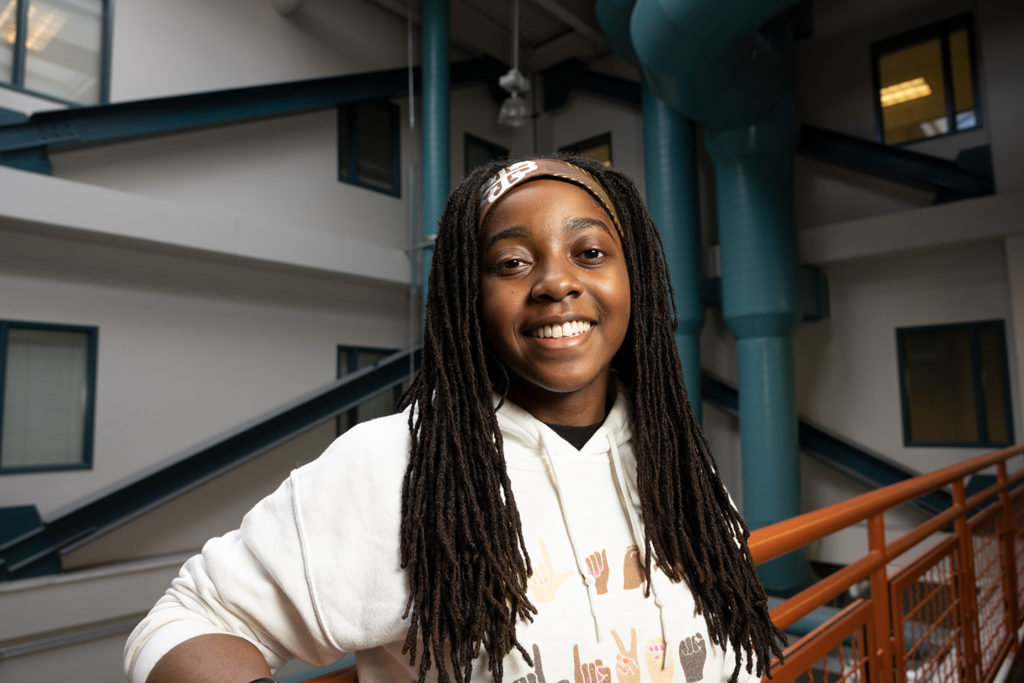
Photo by John Eisele/CSU Photography
Janaye Matthews lives by the advice of her mentor: “Don’t stop. Ever.”
That mantra kept Matthews going when she found herself questioning her choice to become an engineer – and it fueled her tireless efforts to make Colorado State University a better place for students with marginalized identities.
This month, Matthews will graduate from CSU with dual bachelor’s degrees in biomedical engineering and electrical engineering and minors in mathematics and ethnic studies.
“Janaye is one of the most amazing people I’ve ever worked with in my 30-plus years in academia,” said Brett Beal, academic advisor for the School of Biomedical Engineering.
Matthews sees the world through the lens of empathy, from her leadership of multiple student organizations to her humanitarian work in developing nations. Among her many accomplishments, Matthews was named the winner of the 2021 Multicultural Undergraduate Research Art and Leadership Symposium, or MURALS, for her project spotlighting historical and contemporary implications of racial health disparities in the United States.
In their own words
Q. What was the most rewarding part of your CSU experience?
Crafting my own narrative around what it meant to be an engineer. Early on, I struggled to connect with the motivations of some of my peers, or with the “typical” pathways into engineering careers. That pathway was presented to me in a way that felt like a box I didn’t want to be put in, or a world I couldn’t see myself living in. But there was something about engineering still that drew me in, challenged me, and motivated me. I also felt compelled to expand my knowledge beyond the scope of technical concepts into areas that encompassed my identities and experience more holistically. I learned how to apply the mechanisms of problem-solving and analysis that were being developed in classrooms to help improve the experience of students with marginalized identities at CSU.
That’s where I found the definition of engineering that fits for me: I want to be an advocate. Most rewarding of all, I found better solutions not only in scientific research and development but also in pursuit of social justice and equity.
Q. What obstacles, if any, did you have to overcome to reach graduation?
Grappling with imposter syndrome. From my first day to my last, it was exhausting and isolating. Some of it was the reality of being the only Black student, or one of a few, in every classroom, whether there were 10 students or 100. That’s something I know didn’t start, or end, in engineering spaces — it reflects the experience of many Black students who make up less than 3% of CSU’s predominantly white campus. It’s our reality every day. I never felt like I was up to par with my peers in the classroom. I didn’t see my interests, or myself, reflected in my coursework or my classmates, and that contributed to a constant feeling of isolation. I’ve told students that nobody gets through engineering alone, yet it often felt like that for me. It wasn’t until this last year that I was able to overcome my fears of inadequacy and difference to ask for help and connect with students and professors.
I would have never guessed my Blackness would become an obstacle on the path to my degrees, yet that’s what it felt like. I constantly struggled to find spaces where my identity was a source of empowerment on campus. This manifested as a search for harmony between my role as a student activist with a rigorous coursework. I connected with BIPOC students through our shared experiences and the desire to learn about our identities in ways that weren’t part of our education growing up. But we also shared the experience of having to cope with, and push back against, the constant racism and discrimination that we faced on campus.
“I felt obligated to push this institution to do better so that current and future students would not have to endure the depleting and denigrating racially charged incidents that defined so much of my time at CSU. Pushing for visibility and institutional change was just as important to me as my academic progress.”
I felt obligated to push this institution to do better so that current and future students would not have to endure the depleting and denigrating racially charged incidents that defined so much of my time at CSU. Pushing for visibility and institutional change was just as important to me as my academic progress.
Q. What is your advice to incoming students at CSU?
There will always be a traditional path through your major program and into a career. If it doesn’t work for you, have the courage to step off that path of least resistance and form your own path. For the students who don’t see themselves reflected in their professors, classmates, or campus as a whole: No matter what you’re told or how you’re treated, you have the right to be here, and you have the power to bring about change.
Outstanding Grads Fall 2021
The Class of 2021 represent the very best of Colorado State University, remaining stalwart and pursuing their degrees in the face of challenges and uncertainties. Read more stories of some of the outstanding students who are graduating this fall. read more